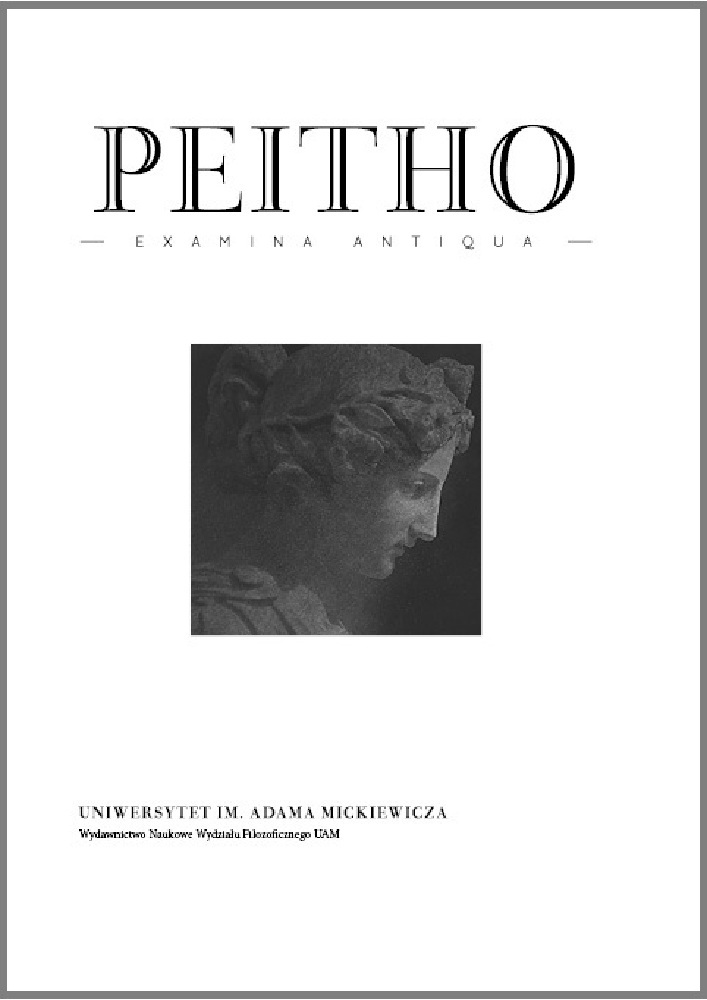Abstract
The essay examines the description of virtue as a craft that governs the proper use of possessions in Plato’s Euthydemus and Stoicism. In the first part, I discuss Socrates’ parallel between wisdom and the crafts in the Euthydemus, and the resulting argument concerning the value of external and bodily possessions. I then offer some objections, showing how Socrates’ craft analogy allows one to think of possessions as (qualifiedly) good and ultimately fails to offer a defense of virtue’s sufficiency for happiness. In the second part, I examine the Stoics’ craft analogy and note a number of differences from Socrates’ account in the Euthydemus. These include the Stoic claim that external advantages never make any contribution to happiness, even when properly used, and the claim that, unlike other crafts, wisdom does not require any external possessions in order to be exercised and yield benefit and happiness. I then place these differences against the backdrop of the debate regarding virtue’s sufficiency for happiness and argue that the Stoic craft model of virtue fares better than its Socratic antecedent.References
Arnim, H. v. (ed.), 1903–1905, Stoicorum Veterum Fragmenta, 3 vols., Leipzig.
Alesse, F., 2000, La Stoa e la Tradizione Socratica, Napoli.
Annas, J., 1993, “Virtue as the Use of Other Goods”, Apeiron, 26, pp. 53–66.
Annas, J., 1999, Platonic Ethics, Old and New, Ithaca.
Barney, R., 2003, “A Puzzle in Stoic Ethics”, Oxford Studies in Ancient Philosophy 24, pp. 303–340.
Bobonich, C., 2002, Plato’s Utopia Recast, Oxford.
Brennan, T., 2005, The Stoic Life: Emotions, Duties, and Fate, Oxford.
Brickhouse T., Smith, N., 1994, Plato’s Socrates, Oxford.
Burnyeat, M., 2003, “Apology 30b2–4: Socrates, Money, and the Grammar of Gignesthai”, Journal of Hellenic Studies 123, pp. 1–25.
Chance, T. H., 1992, Plato’s Euthydemus: Analysis of What Is and Is Not Philosophy, Berkeley.
Cooper, J. M., 1999, “Greek Philosophers on Euthanasia and Suicide”, in: J. M. Cooper, Reason and Emotion, Princeton, pp. 515–541.
Dentsoras, D., 2008, “Seneca and the Old Stoics On Natural Law and Suicide”, Maritain Studies/Etudes Maritainiennes 24, pp. 35–56.
Dillon, J. (trans., comm.), 1993, Alcinous. The Handbook of Platonism, Oxford.
Dimas, P., 2002, “Happiness in the Euthydemus”, Phronesis 47, pp. 1–27.
Erler, M., 2017, Kommentar, in: Platon, Werke, Bd. VI 1: Euthydemos, Göttingen.
Frede, M., 1999, “On the Stoic Conception of the Good”, in: K. Ierodiakonou (ed.), Topics in Stoic Philosophy, Oxford, pp. 71–94.
Inwood, B., 1985, “Goal and Target in Stoicism”, The Journal of Philosophy 10, pp. 547–556.
Inwood, B., 1985a, Ethics and Human Action in Early Stoicism, Oxford.
Irwin, T., 1995, Plato’s Ethics, Oxford.
Irwin, T., 1998, “Socratic Paradox and Stoic Theory”, in: S. Everson (ed.), Ethics, Cambridge, pp. 151–192.
Jones, R. E., 2013, “Wisdom and Happiness in Euthydemus 278–282”, Philosophers’ Imprint 13, pp. 1–21.
Kent Sprague, R. (trans.), 1965, Plato. Euthydemus, Indianapolis.
Long, A. A., 1967., “Carneades and the Stoic telos”, Phronesis 18, pp. 59–90.
Long, A. A., 1988., “Socrates in Hellenistic Philosophy”, The Classical Quarterly 38, pp. 150–171.
Long A. A., Sedley, D. N., 1987, The Hellenistic Philosophers, vol. 1, Cambridge.
Parry, R. D., 2003, “The Craft of Ruling in Plato’s Euthydemus and Republic”, Phronesis 48, pp. 1–28.
Reshotko, N., 2006, Socratic Virtue: Making the Best of the Neither-Good-Nor-Bad, Cambridge.
Rider, B., 2012, “Socrates‘ Philosophical Protreptic in Euthydemus 278c–282d”, Archiv für Geschichte der Philosophie 94, pp. 208–228.
Schofield, M., 2003, “Stoic Ethics”, in: B. Inwood (ed.), The Cambridge Companion to the Stoics, Cambridge, pp. 233–256.
Sharples, R. W., 2000, “The Sufficiency of Virtue for Happiness: Not so Easily Overturned?”, Proceeding of the Cambridge Philological Society 46, pp. 121–139.
Sharples, R. W. (transl.), 2004, Alexander of Aphrodisias. Supplement to On the Soul, Ithaca.
Striker, G., 1986, “Antipater, or the Art of Living”, in: M. Schofield,
G. Striker (eds.), The Norms of Nature: Studies in Hellenistic Ethics, Cambridge, pp. 185–204.
Striker, G., 1996, “Plato’s Socrates and the Stoics”, in: G. Striker, Essays on Hellenistic Epistemology and Ethics, Cambridge, pp. 316–324.
Vlastos, G., 1991, Socrates, Ironist and Moral Philosopher, Ithaca.
License
Peitho provides immediate open access to its content on the principle that making research freely available to the public supports a greater global exchange of knowledge.
